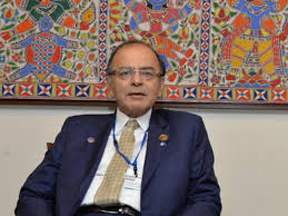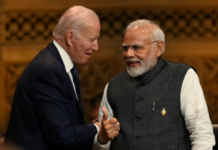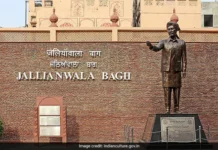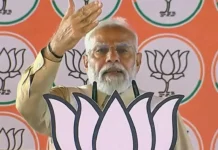 NEW DELHI: The long-pending Goods and Services Tax (GST) Bill was on Friday moved in the Lok Sabha for consideration amid stiff resistance by several Opposition parties, even as Indian Finance Minister Arun Jaitley said it is a “win-win” measure and states have nothing to fear.
NEW DELHI: The long-pending Goods and Services Tax (GST) Bill was on Friday moved in the Lok Sabha for consideration amid stiff resistance by several Opposition parties, even as Indian Finance Minister Arun Jaitley said it is a “win-win” measure and states have nothing to fear.
Members of Congress, led by Sonia Gandhi, along with those of Trinamool Congress (TMC), Left and Nationalist Congress Party (NCP) staged a walk out after their plea for referring the Constitution Amendment Bill to the Standing Committee was not accepted. AIADMK and Biju Janata Dal (BJD) also opposed its consideration but did not walk out.
The Opposition members, which alleged that the government was “bull-dozing” and bringing the bill in “hush hush” manner, wanted more time to study the “new” legislation and meanwhile finish the financial business.
Jaitley assured all cooperation from government to complete the business of demands for grants of various ministries before Guillotine is applied on April 28.
After hour-long wrangling over the procedures between the ruling and the opposition sides, the Bill was taken up when Speaker Sumitra Mahajan ruled that it is an important legislation on which the Finance Minister can make introductory comments and a discussion can be taken up at a later date.
Commending the Bill for consideration and passage, Jaitley said: “GST is going to lead to a win-win situation as far as the centre and the states are concerned. It is going to up India’s GDP. It is going to up India’s revenue and therefore I commend GST Constitution Amendment Bill to the House for (consideration)”.
Seeking to assuage fears of states that they will lose out on revenues once GST is implemented, he said the Centre and the States will have concurrent power to levy tax on goods and services.
Stating that when Value Added Tax (VAT) was introduced, states demanded compensation for more than five years.
However, not a single state asked for compensation on the sixth year.
“Therefore, please do not have this fear (of revenue loss on account of GST implementation),” he said, adding, besides, ease of doing business, GST will help “trade to grow and taxation of states will not be lost in any manner”.
Jaitley noted that the process of bringing the Bill had started during previous NDA rule in 2003 and the last UPA government had pushed it and the Parliamentary Standing Committee had also examined it for over two and a half years.
“I think, we did not have a more extensive debate on any Bill since 1950.”
Seeking support of Congress before its members walked out, the Finance Minister said, “Nobody has the monopoly in trying to stop the growth of this country. UPA must start supporting legislations which it brought in. This is a kind of contradiction I am not able to understand.”
He said Congress should be happy that NDA brought the legislation. “Why are you delaying it? It was a good work done by your government which we not only accepted, completed and going forward. Don’t delay the process you started.”
Jaitley also asserted that “It is not merely the advantages of GST but also the maturity of the political system that how much more will India wait to reap the advantages of it.”
He underlined that it was in the “wisdom of Parliament and wisdom of state Finance Ministers to converge so that a consensus is arrived at” as he noted that it has gone through two central governments and four state Finance Ministers in the capacity of heads of Empowered Group of Ministers.
As regards the compensation to the states on account of any possible loss of revenue following implementation of the GST, Jaitley said there will be 100 per cent compensation in first three years, 75 per cent in the fourth year and 50 per cent in the fifth year.
He said in the sixth year, nobody would require compensation as they would have got revenues by then as was the case with VAT.
The bill on GST, which will be the biggest tax reform after 1947, was introduced in the Lok Sabha in December last year. A single rate of GST will replace central excise, state VAT, entertainment tax, octroi, entry tax, luxury tax and purchase tax on goods and services to ensure seamless transfer of goods and services.
While liquor has been completely kept out of the GST, petroleum products like petrol and diesel will be part of the new regime from a date to be decided at a future date by the GST Council, which will have two-third of its members from states. .
Insisting that states have nothing to fear, Jaitley said, the structure of the GST Council is such that states have the veto power. “States have two-third majority and therefore even half of them come together, they have a veto. This federalism leans in favor of states,” he said.
“All decisions in the Council will require 75 per cent votes… That is the decision-making process that is how we have integrated the whole system of cooperative federalism in the taxation system.”
As per the Bill, the states where goods originate can levy 1 per cent additional tax over GST to make up for any revenue loss for the first two years.
“The inbuilt consensus is, in terms of cooperative federalism, Centre and States will then have to work together.
Federalism does not mean trampling the rights of the states.
“Federalism does not mean … that the Union ceases to exist… If all states come together, even if some of the states come together, they can prevent the Union from taking a decision,” Jaitley said.
The consideration of the Bill was also opposed by AIADMK, whose leader and Deputy Speaker M Thambidurai contended that it should be scrutinized by the Standing Committee as his state Tamil Nadu would stand to lose to the tune of Rs 16,000 crore.
Jaitley said, “You will not lose even one rupee”.–PTI






